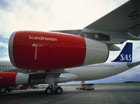SAS launches radical restructure including 40% staff cuts
 SAS Scandinavian Airlines is launching a drastic restructuring plan as it attempts to stem huge losses and reduce its activities.
SAS Scandinavian Airlines is launching a drastic restructuring plan as it attempts to stem huge losses and reduce its activities.
Under the “Core SAS” programme, the group said it would reduce its workforce by up to 40 percent from around 23,000 to 14,000. This would involve cutting 3,000 jobs in addition to 5,600 jobs that would go through disposals or outsourcing deals. It is planning a SKr6bn rights issue to carry out the overhaul.Shares in the group fell by 21 per cent in early trading as it unveiled its annual figures. These include making a SKr6.3bn net loss last year including SKr4.9bn from last week’s disposal of its troubled Spanish subsidiary Spanair. This compare to a net profit of SKr636m a year earlier.
The restructuring will lead to a 30 percent reduction in the fleet and a 25 percent reduction in turnover.
SAS is fighting to survive as an independent airline group within the consolidating European aviation industry. It is planning to dispose of many of its subsidiary airlines and holdings outside the Nordic region including Spanair, AirBaltic, Air Greenland, Spirit, Estonian Airways, Skyways, Cubic, as well as its 20 percent stake in BMI British Midland.
Some of the disposals have already been agreed, including the sale of heavily-indebt Spanair, which it sold to a group of Catalan investors for a nominal €1. It has also divest its 47.2 percent stake in AirBaltic to the Latvian carrier’s management.
ADVERTISEMENT
SAS said it would also close or outsource parts of its cargo, engineering and ground handling operations.
The group is abandoning its ill-fated expansion strategy of the last two decades, which took it into loss-making ventures in Spain, the UK and the Baltic states, as it seeks to concentrate on its home Nordic region.
SAS said it was planning to reduce its network by cutting unprofitable routes and further reducing capacity. This would involved a 10 percent reduction of its short-haul fleet within Scandinavian Airlines and 18 per cent of its long-haul fleet.
Mats Jansson, SAS chief executive, said, “2008 will probably go down in history as one of the most challenging and turbulent years that the entire aviation industry has ever experienced.”
——-

